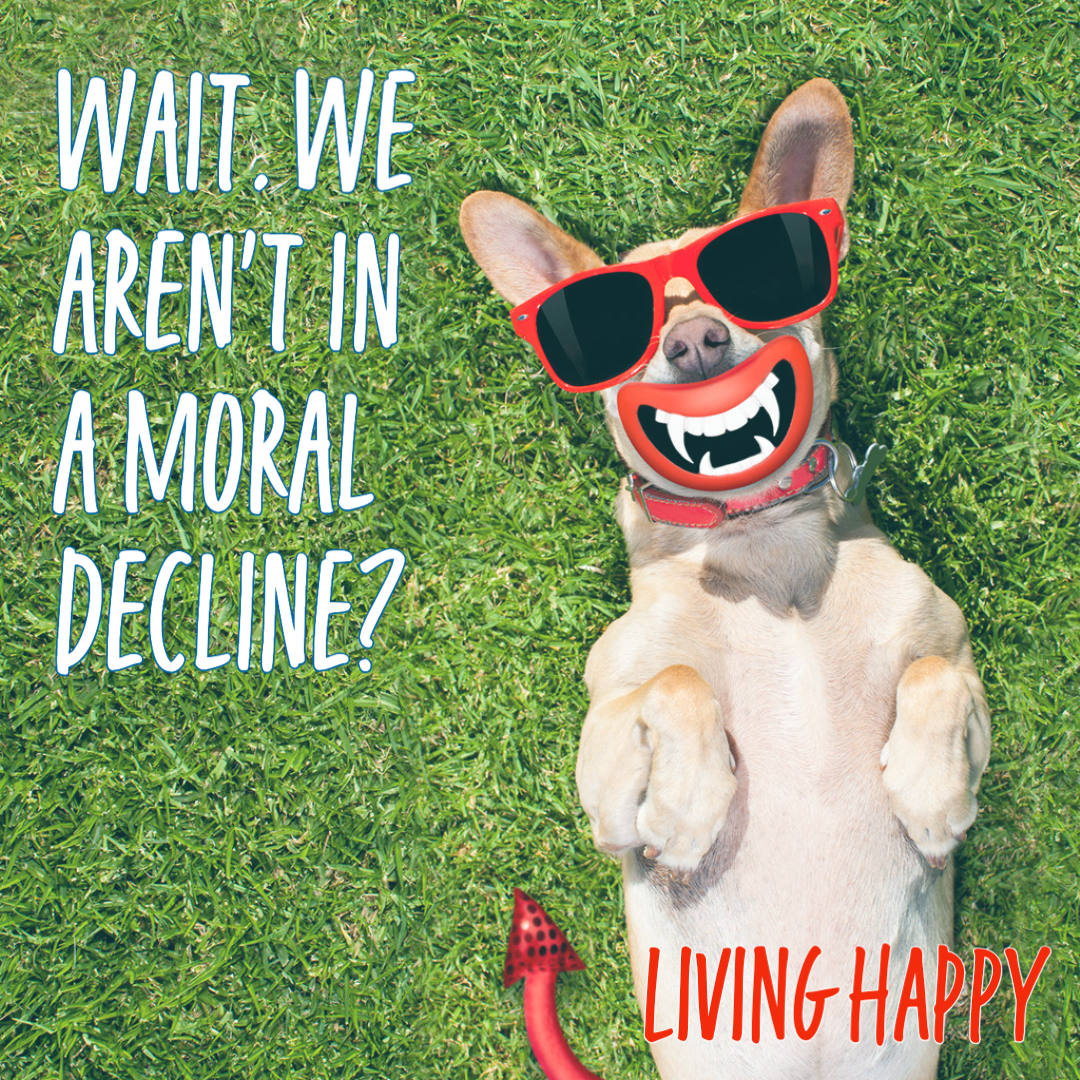Wait. We aren't in a moral decline?
Living Happy
This week there was a controversy over a country music star’s video. This post isn’t about that. Not really. But the video became, as many things do, a litmus test about politics. People avowed to de-friend anyone who was okay with the song or the video or the singer. People avowed to de-friend anyone who wasn’t okay. And so it went. Sides were drawn.
One of the comments on one of the posts really got to me because it said, “I don’t even know who this man is. I’ve never listened to this song. I would die before I listened to country.”
This intrigues me, right? Because it’s holding up ignorance as a powerful thing—as something to be bragged about. It holds up the exclusion of an entire genre of music as a positive.
CHOOSING IGNORANCE LEADS TO BEING UNPREPARED
People do that to all sorts of things. They say it about romance novels, about Kpop, about science fiction, children’s books. They say it about types of shows—or screens. They say it about religions, politicians, groups of people. I would never talk to a Republican, a conservative. They say it about sexuality and gender. They say it about a lot of things.
And then they are surprised when hate happens. It becomes that Marie Antoinette “let them eat cake moment” where we are so divorced from other groups of people or what they love and like and what terrifies them that we’re shocked that they are even there at all.
We create bubbles around us, closing out other people’s realities in big and small ways and that leads to confusion when things happen that don’t mesh with our reality of the world.
This happens a lot during elections. We are stunned people could actually vote for that other candidate. How is that possible? Right?
WHAT WE FOCUS ON
In the world of news (I have a hyperlocal news blog), the stories that get the most play are the super negative ones and the super positive ones. The extremes.
The news we focus on impacts the people that are reading it. As a post by Jill Suttie says on The Greater Good says,
“When we read the news, it’s hard not to get depressed about the state of the world. Stories of vitriolic politicians, unethical CEOs, and indifference to the suffering of others fill its pages, leaving us feeling like goodness and morality are nowhere to be found.”
The thing is that while it’s important to be informed about things that are happening that aren’t cool at all, when that is all we see or focus on, we’re not seeing the world in its entirety.
When we exclude good stories, when we proudly proclaim that we are ignorant of a celebrity’s existence or that we never read or listen or hear or watch an entire genre, we are narrowing our understanding of the world. We are also allowing ourself to live in an illusion.
WE ARE ACTUALLY HOLDING STEADY ON ETHICS
Suttie writes,
“According to a recent Gallup poll, people in the United States think that morality is at an all-time low. But, according to a new study, this belief is likely an illusion, based on the way our minds work—not a conclusion based on evidence.
“In the study, recently published in Nature, researchers looked at several surveys of hundreds of thousands of Americans and people from 59 other nations around the world. In the surveys, participants had shared their views on whether honesty, ethical behavior, and moral values had been increasing or decreasing in their society or country.
“In every country polled, people tended to think moral, ethical behavior was on the decline. This belief held steady no matter when the survey was given, too (whether 1949 or 2019)—suggesting that people always tend to see morality as waning in their lifetime. This perception seems unlikely to be true, says lead researcher Adam Mastroianni, formerly a postdoctoral student at Columbia University.
“’You might think that people are sensitive to things happening around them or in their country, and that dictates what they think about people getting better or worse (from a moral conduct standpoint),’ he says. ‘But it doesn’t seem that way, because pretty much whomever you ask, and wherever and whenever you ask them, people give you the same answer—people are less kind today than they used to be.’”
In my own town, I often see the belief that people are less kind, less ethical, less cool now, more greedy, more devious, more criminal now than the past.
But this is a vacation town that was originally built by tycoons of steel and railroads, philanthropists and philanderers. And I find that a tiny bit hard to believe. And though those big-money visitors created a national park and funded land preservation, a library, a hospital, there are still people doing the same thing now. Our tiny town of 5,000 just supported a $13 million library addition and backed a $55-million bond for a badly needed new school.
On a smaller level, people at the grocery store still help you reach things on the top shelf. People on the street—most of them—still make room on the sidewalk for you, which is why it’s stunning when someone doesn’t.
People still notice when someone’s dog is loose and help try to catch it. Same with cats.
People give and give and give. All the time. In big ways and little. That often doesn’t get celebrated and sometimes it doesn’t seem to make it into our understanding of the world until we actually stop and think about it.
Suttie writes,
“Mastroianni and Gilbert analyzed some other available surveys: Between 1965 and 2020, over 4 million respondents around the world had reported on their own and others’ moral behavior, in response to questions like “Were you treated with respect all day yesterday?” and “Would you say that most of the time people try to be helpful, or that they are mostly just looking out for themselves?” and “During the past 12 months, how often have you carried a stranger’s belongings, like groceries, a suitcase, or shopping bag?”
“After analyzing these responses, Mastroianni and Gilbert found that, no matter the year, people saw their own behavior and the behavior of people around them as generally good, with little personal experience of immoral behavior to back up their belief that morality was slipping. This was true 90% of the time, says Mastroianni, and was true for both Americans and people from other countries.
“This is why Mastroianni thinks that people’s views around moral decline are an illusion.
“’If people are far less kind today than they used to be even just a couple years ago, it should be easy to find some evidence of that shift. So, if you ask people how they were treated today, fewer people should say ‘yes’ today than they did five years ago,’ he says. ‘But we find no evidence of that going on. In fact, we find pretty strong evidence that it’s not going on.’”
Part of this could be that we are treated with respect because we choose to surround ourselves with people who respect us (good choice, by the way!). Part of this could also be a little worrisome—when do our choices (like to know nothing about country music or hip hop or classical or the politics of others) keep us in a bubble that makes us unprepared for what might happen or narrow in our own thinking?
But overall? Yeah, this seems pretty cool that moral decline might be an illusion. So, why do we choose that? And why do pompously tell the world that we choose to be ignorant?
The Daily Stoic has a passage in its emailed newsletter today that says,
"In the demands of daily life, in the immediacy of a heightened moment, in the pincering crush of competing interests—we rarely make good decisions. Whether it’s because we don’t have all the information, or we are biased by impressions, or we are blinded by emotions…it doesn’t really matter. What matters is the virtuousness of the decisions we make."
I can’t imagine why you would want to deliberately live in an illusion, in exclusion, especially when it’s a negative one. But I try to and maybe it just feels safer? Makes us feel morally superior? I’m not sure.
Suttie writes,
“Unfortunately, our biases, while leading us astray in some ways, are also fairly hard-wired—and for some good reasons. Being alert to negative news can make us more cautious and keep us safer, and looking at the past more benignly can help us feel good and move on from bad events in our lives that might otherwise keep us stuck.
“Still, Mastroianni worries that if we have an overall pessimistic view about people’s morality, it may interfere with trusting others, which could lead to social problems. It might make it harder for people to do business with each other or have the courage to go on dates or form loving relationships.
“While he wishes our daily news diet was less sensationalist and provided more context, he doesn’t see that happening anytime soon. But one thing people could do to lessen this warped view is to try practicing a bit more humility. When comparing the present to the past or past generations to younger generations, we should be a lot more cautious about making judgments about their morality or any other character trait.
“‘Just because a feeling comes to mind easily—like people are less moral than they used to be—doesn’t mean that you’re actually right,’ he says. ‘The ease of thinking something is not an indication of its accuracy.’”
All the photos in this post, I took in my town in the last two days.







